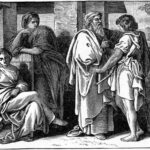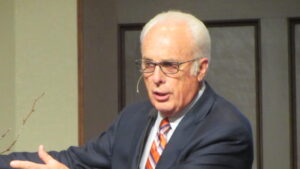History is full of surprises. Sometimes, history is downright stranger than fiction. Church history, including Baptist history, is no exception to this principle.
When the Baptist movement, as we know it today, emerged in the seventeenth century, early Baptists had to settle their views on several important issues. For those with a cursory knowledge of Baptist life and history, you can probably guess some of the significant questions: Calvinism vs. Arminianism and Open vs. Closed Communion, for example. Yet, some early Baptist disagreements may be a shock. In my experience, many present-day Baptists are baffled when they learn that the singing of hymns in worship (a practice taken entirely for granted in Baptist churches today) was the flashpoint of a colossal Baptist controversy.
While not sparking as heated a debate, yet likely just as startling, Christians today might be surprised to learn of the diverse views of polity (i.e. church government) present among early Baptists.
Both inside and outside Baptist churches, Baptists are largely known for two convictions: (1) Credobaptism (only baptizing those who profess faith) and (2) Congregationalism (the autonomy of the local church). Both these positions are largely taken for granted by Baptists and by other Christians interacting with Baptists. While the subject of baptism might come to mind first (we’re called Baptists after all), our adherence to Congregationalism, and its obviously implied rejection of higher courts (Presbyterianism) or overarching overseers (Episcopalianism) over churches is a definitive Baptist hallmark.
Therefore, just as you would never see a Baptist church sprinkling a baby, you’d never see a Baptist church submitting to a regional bishop… or would you?
Hanserd Knollys said what?
As is the case today and is true across the denominational landscape, seventeenth-century Baptists had their heavy hitters: Among the numerous big names, Benjamin Keach, William Kiffen, and Hanserd Knollys stand as the most influential, both in their time and in their lasting legacy that shaped the Baptist movement over the centuries.
Thus, I imagine that many people may be surprised to learn that Hanserd Knollys, one of the great fathers of the Baptist movement, publicly advocated for what we would recognize today as a modified episcopal form of church government. Put simply, in Knollys’ The World that Now Is; and the World that is to Come (1681), he essentially argued that above local churches, in each city, there should be an overarching bishop.
After explaining that the office of elder is not “lordly” and that elders serve merely as stewards, Knollys states, “The Apostles, Bishops, Pastors and Teachers, were Fellow-Elders […] But they were not all of equal Dignity and Authority. It doth appear, (at least I think so, and indeed it is my Opinion) that there was (even from the Beginning of the Gospel of the Grace of God) a Priority and Pre-eminence among the Ministers of Christ, approved of God; yea, and appointed by himself in the Church” (Knollys, The World that Now Is, 57–58).
Essentially, Knollys puts forward that there was never a strict parity between the elders of the Church. For example, the apostles had a place of preeminence over prophets, evangelists, and pastors. From there, citing the examples of Timothy (1 Timothy 1:3) in Ephesus and Titus (Titus 1:5) in Crete, Knollys argues that the Evangelists, as Bishops, had an authority above local church pastors (Knollys, 58–60). To further this point, he also cites Revelation 1 and 2 and the angels, interpreted as bishops, associated with the churches in each city (Knollys, 62–63). Yet, Knollys does not end his case there. In quintessential early Baptist fashion, Knollys turns to church history. Among many patristic examples, he points to the clear distinction between the leading bishop and the presbyters (i.e. elders) found in Ignatius of Antioch’s epistle to the Ephesians.
After this extended dialogue, Knollys concludes this chapter on church government by outlining his vision for Baptist churches:
I mean and intend any one of the Bishops, Pastors, Teachers, Presbyters, or Elders, who are, or shall by the Consent, Approbation and Choice of the rest be appointed, ordained, and set over them as Chief Bishop or Presbyter of the Church in any City and Villages adjacent, who for Order sake in Gospel-Government, hath Priority, Pre-eminence, and Authority above the rest of the Presbyters or Bishops of the same Church, not alone, nor without them, but when Convened with them, to Act, Rule, Guide, Order and Govern with their Consent, Suffrage and Assistance, according to the Laws of the Lord Jesus Christ, the Constitutions and Commandments, the Practice and Example of his holy Apostles (Knollys, 68–69).
And just like that, we have one of the great Baptist fathers of the seventeenth century explicitly arguing for a single Chief Bishop to have authority over the Church in each municipality. For any Baptist who has given any mind to ecclesiology, church government, and Baptist identity, I’m sure this comes as a major surprise. So what do we do with this information?
Some Further Context
Before offering some sort of analysis or response or getting into the “so what,” it’s worth recognizing some of the ways in which Knollys’ position wasn’t unique but also a clear minority and (probably) strictly theoretical position.
On the one hand, we have to remember that in the seventeenth century, Baptists were still developing and clarifying their thoughts and identity, including on the subject of polity. While Knollys was a leader among the much larger and more influential Particular (Calvinistic) Baptists, we have on record that the General (Arminian) Baptists of the seventeenth and eighteenth centuries used the title ‘bishop’ for a role beyond and above that of local church elder (see An Orthodox Creed of 1679). We also have the case of John Tombes, a strong seventeenth-century advocate of credobaptism but who remained convictionally committed to the national Church of England. On numerous topics, the diversity of practice and debates of seventeenth-century Baptists (or people in the Baptistic orbit) would shock, if not scandalize, many Baptists today.
On the other hand, we do not want to overstate the diversity and debates. As helpfully outlined by James Renihan in Edification and Beauty: The Practical Ecclesiology of the English Particular Baptists, 1675–1705, “[Knollys] position is very unusual for Baptists.” Renihan goes on to explain that he can find no evidence that Knollys’ modified episcopalianism was ever even practiced by any Baptist churches, and the truth remains that the majority of Baptists were committed to the familiar principles of elder plurality and parity (Renihan, Edification and Beauty, 101). While Baptist history is full of surprises and can be stranger than fiction at times, it is readily apparent that a cohesive and recognizable Baptist tradition was being developed and codified by the end of the seventeenth century. With that said, what do we do with a view like Knollys’?
A Modern Baptist’s reflection
I should make it clear from the outset of my short response that I am not in agreement with Knollys’ view. In many ways, Knollys reflects and anticipates many common Anglican arguments for their episcopal government when confronted by the spread of Presbyterians and Congregationalists (including Baptists) in England. Thus, as should be expected, numerous Baptist and Congregationalist works have addressed the arguments and made compelling cases for congregational church government: Hercules Collins’ Some Reasons for Separation from the Communion of the Church of England (1682), John Owen’s Gospel Church Government: The True Nature of a Gospel Church and Its Government (1689), Benjamin Keach’s The Glory of a True Church (1697), and Isaac Chauncey’s The Divine Institution of Congregational Churches, Ministry and Ordinances to list a few. However, despite my strong disagreement, I still found encountering Knollys’ atypical view helpful for several reasons.
First, as a Baptist committed to congregational polity, this serves as a reminder that my convictions must be grounded in the Word of God before I adhere to any tradition. While I am grateful for my Baptist fathers and read their words with great respect, they are not the end-all and be-all of my theological convictions. Baptist individuals and churches throughout history have held and practiced many beliefs. Before being received as instructive or corrective, the works and views of my spiritual ancestors must be held against the infallible and timeless standard of Scripture.
Second, this is a powerful reminder that traditions can grow and even change. As political and social contexts change, as new situations and challenges arise, and as constructive debates and dialogues take place, we should not be surprised when our particular tradition’s convictions deepen, language develops, and, at times, beliefs require reform. Just as we see in general church history, from the development of Trinitarian language arising at Nicea in response to Arianism or the clarification of the doctrine of justification in the Reformation in response to late medieval theology, Baptists, and Evangelicals more broadly, can and should expect similar developments within our particular Christian tradition.
Third, Knollys serves as a reminder that many differences and disagreements do not immediately lead to someone being kicked out of the camp. Despite arguing for an overarching bishop, Knollys is still recognized as a leading Baptist churchman of the seventeenth century. While a Baptist holding Knollys’ view today should probably cause a major stir, especially given the clarity and solidification of the following centuries, there are surely many places where Baptists do have room for dialogue, development, and even disagreement, just as they did in the seventeenth century.
Even in this piece’s specific example, I would seriously have to consider how I would relate to Baptists from one of several Baptist Associations globally, who are led by bishops: Are they Baptist brothers and sisters with whom I have a strong disagreement, or are they associations of baptistic churches who fall short of genuine Baptist identity? As twenty-first-century Baptists, or evangelical Christians in general, there are numerous topics in which we will have to ask such questions. And how we answer these questions can have weighty consequences.
But as we make those decisions, let us lead with charity and respect; let us acknowledge that traditions can develop but have definitional tenets that must be honoured; and finally, let us always remember to keep the Scriptures as our first and final guide when it comes to our personal and ecclesial convictions.
























